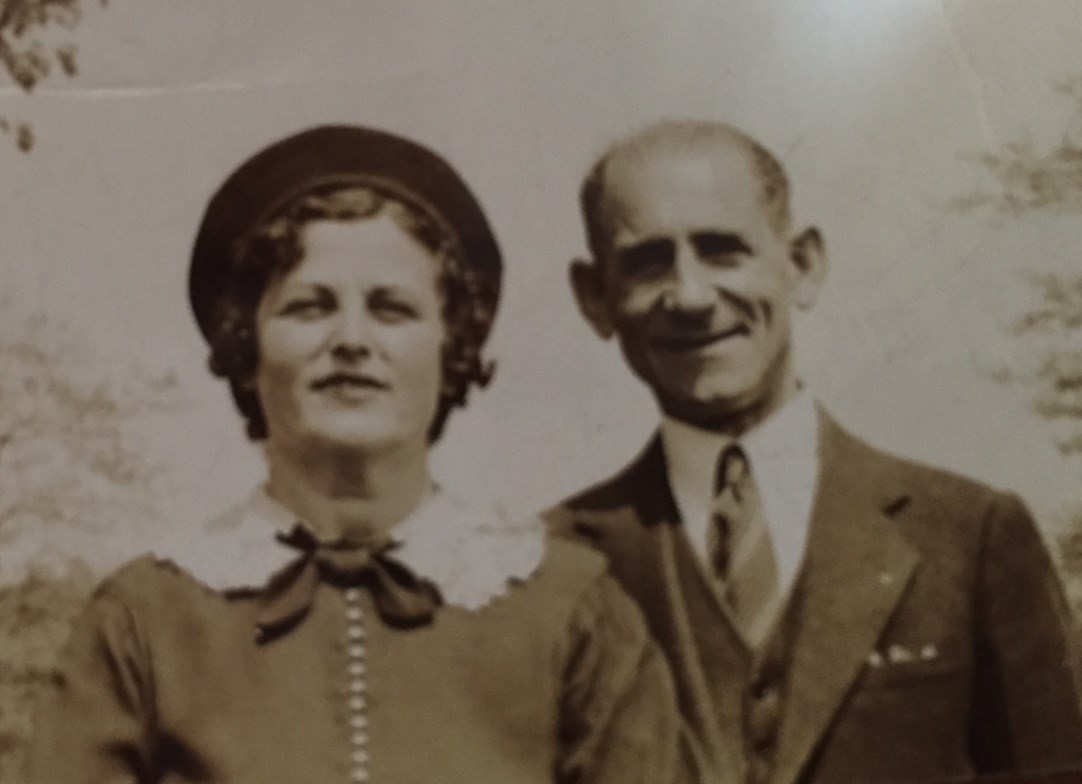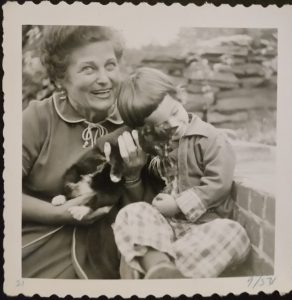
Bertha and David aka Nana and Papa
Readers of Retrospect may recall my maternal grandparents from two other stories, No Way To Say Goodbye, about my grandfather’s death, and Which Side Are You On?, in which I discussed their flight from the Cossacks and their search for the American Dream. They were a significant part of my childhood, living with my parents, my sisters, and me in our big red brick house in New Jersey. We called them Nana and Papa. (Interestingly, one of my sisters now has two grandchildren, and she has them call her Nana too.)
Both of them arrived at Ellis Island sometime between 1905 and 1910. I believe that Bertha came from Kiev, in what is now Ukraine, and David came from Pinsk, in what is now Belarus. However, when I was growing up, it was always just Russia. Borders were pretty fluid in those days, but they certainly considered themselves Russian rather than Polish, Ukrainian, or anything else, and the language they spoke (in addition to Yiddish) was Russian.
Bertha came to America with her parents and a brother and sister when she was probably around 10 or 12, and they lived on the Lower East Side of New York. Her name in Hebrew was Basya (which would now be Batya under modern Israeli pronunciation). When she wanted an American name, she chose Bertha, which I always thought was an unattractive-sounding name. Maybe she thought it sounded less like an immigrant than Bessie, which would have been the obvious choice. She worked in a garment factory, like all the young immigrant girls of the day. When I learned about the Triangle Shirtwaist Factory fire in history class, I was very thankful that she hadn’t worked in THAT factory! Her father had been a merchant in the old country, and they brought some diamonds with them when they left, sewed into their garments to avoid detection. The diamond ring I wear is one of the diamonds they smuggled into the US, and I treasure it for that reason. I gave my oldest daughter, Sabrina, the Hebrew name Batya in memory of my grandmother.
David came by himself to join two of his brothers, Abe and Pinchas, who were already in New York. His parents and other siblings stayed behind. His story of being smuggled over the border in the bottom of a hay wagon was exciting and terrifying to me as a child. He must have been about 17 years old, and traveled halfway around the world on his own. His name was David, so no Americanizing was required. He and his brothers started an independent painting and wallpapering business.
The story of how they met is a bit vague. Apparently Bertha’s parents had a store — or maybe it was a pushcart — on the Lower East Side, and David saw her there and was interested. He started coming around frequently, and invited her to take long walks across the Brooklyn Bridge and back. And then they got married. David was about 7 years older than Bertha. At some point after they married, they moved to New Jersey, where they could have a house and a yard for their children. They never had a car though, which must have made it hard for him to transport his painting and wallpapering equipment and supplies to his various jobs. They both took great pains to get rid of their accents, and they succeeded. Listening to them speak, you would not guess that English was not their native tongue.
Politically, they were Socialists. I remember learning from them about Eugene Victor Debs, who ran as the Socialist Party candidate for President five times. David and his brothers went to meetings of The Workmen’s Circle, an American Jewish organization formed as a mutual aid society to help Eastern European immigrants. It stood for socialist ideals, promotion of Jewish arts and music, and the preservation of the Yiddish language. It also came to be very influential in the American labor movement. I was taught from a very early age never to cross a picket line!
Bertha and David lived in the same house in Jersey City for many years. It was a duplex, they lived upstairs and rented out the downstairs. They had two daughters, and were so proud to be able to send them both to college. And then after finishing college, both girls married doctors, every Jewish parent’s dream! When my mother (their younger daughter) got married in 1943, she and my father went off to Indiana where my father was stationed at a military hospital. After the war they came back to New Jersey with an infant and a toddler, my older sisters, and lived with Bertha and David until they were able to buy their own house. Then at some point, after they were settled in a spacious house with a medical office attached, Bertha and David sold their Jersey City house and moved in with us. This may have been around the time I was born, because my sisters (who are 5 and 7 years older than I) remember going to visit them in Jersey City, but I do not.
Having my grandparents live with us had many benefits. My sisters and I never had a babysitter when we were growing up, because if my parents were going out, my grandparents were there to take care of us. Although Nana never learned to drive, Papa had his license and was available to take us any place we needed to go. Papa was also very handy – not only did he do any painting or wallpapering that was needed around the house, he could fix anything that was broken. He was warm and loving, and more like a father to us than our father, who was working all the time. Nana made the best rice pudding in the world, which still makes me salivate when I think about it. They were both very musical too, and passed their love of music on to us. Papa played the clarinet, and Nana sang.
Nana loved cats, which is probably how I learned to love them, since my parents were opposed to any kind of pet that was bigger than a goldfish. She would often manage to entice neighborhood kittens or cats into our backyard, and she and I would play with them. However, we were not allowed to bring them inside the house, so I was never able to have one to keep. One of the best photos in my very sparse baby book (classic third child baby book) is this one of Nana and me playing with a kitten in our backyard.
which is probably how I learned to love them, since my parents were opposed to any kind of pet that was bigger than a goldfish. She would often manage to entice neighborhood kittens or cats into our backyard, and she and I would play with them. However, we were not allowed to bring them inside the house, so I was never able to have one to keep. One of the best photos in my very sparse baby book (classic third child baby book) is this one of Nana and me playing with a kitten in our backyard.
My favorite memory of Papa was that every Sunday morning, while the rest of the household was still asleep, he and I would walk down the street about a block to the delicatessen to buy lox, and then another block to the bakery to buy fresh bagels, still hot from the oven. We would usually buy a cake at the bakery too, if there was one that looked particularly delicious. Then we would go back home and have lox and bagels for breakfast. We would have the cake for dessert after dinner. Gastronomically, that was the best day of the week!
Papa died in 1962, and Nana in 1977. Democrats were in the White House at both of those times. I am sure that if they were alive to see what is happening in this country now, they would be even more shocked and terrified than the rest of us.



Such a graceful, luminous portrait of your grandparents! You had the advantage of living in an extended family when nuclear was the norm. I love the mundane yet memorable moments, like playing with a kitten with your Nana or procuring lox and bagels with your Papa. How fitting that your diamond was smuggled in from the old country.
Beautiful story-telling and reflection! I especially appreciated the benefits you describe from the live-in arrangement you had with your grandparents. Regardless of conflicts (many or few), to have a Papa who could stand in for hard-working parents, fix everything, just BE there, I’m sure has shaped your own highly valued sense of family.
And that two-block round trip to deli and bakery, how graphic and precious is that! You two walking down the street together. That would make a great short film, that round trip and home. Oh… and loved the haircut ;-)!
I never knew my grandparents, so this story takes me right to the edge of envy. How lovely that your experience with them was first-hand. Such continuity and strong sense of belonging to one another shines through your memories. Keep writing! Your stories are a true gift.
Such wonderful memories; it must have been great to have them living with you. I love that your diamond was smuggled into the country by your grandmother. And your Sunday walk with your grandfather is priceless – for so many reasons. Buying the food was great, but that precious time with him was also so special; warm and wonderful.
Just a beautiful story, Suzy, and filled with both the big, daring adventures (being smuggled across the border) and the lovely little ones (Sunday morning deli/bakery trips). You have really captured both your own family’s story over several generations and, in many ways, the much larger immigration story for countless Russian Jews. (Do visit the Tenement Museum next time you are in NYC if you have not already done so; it will absolutely resonate.) I am so happy that you have all this knowledge and these wonderful memories.